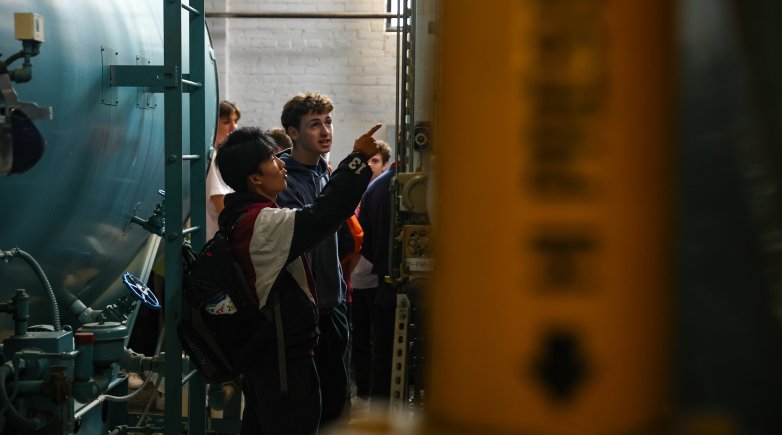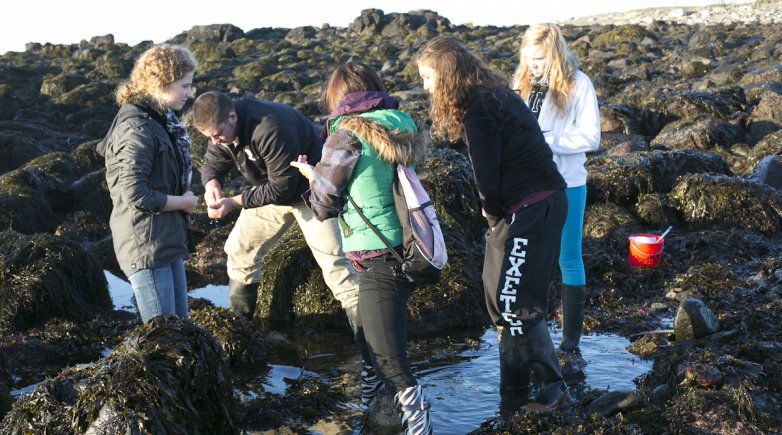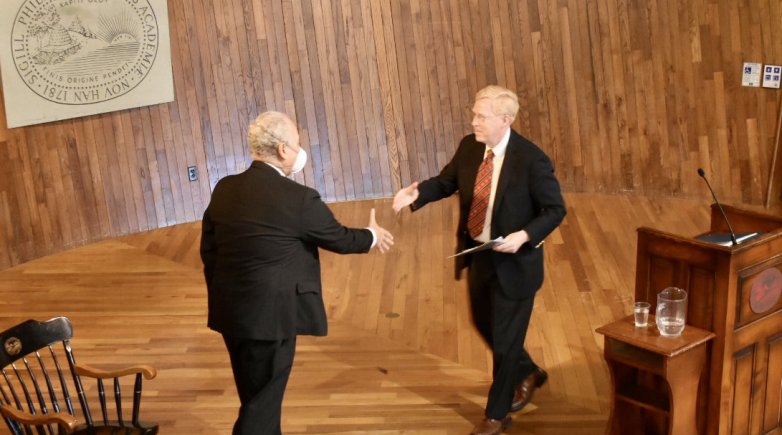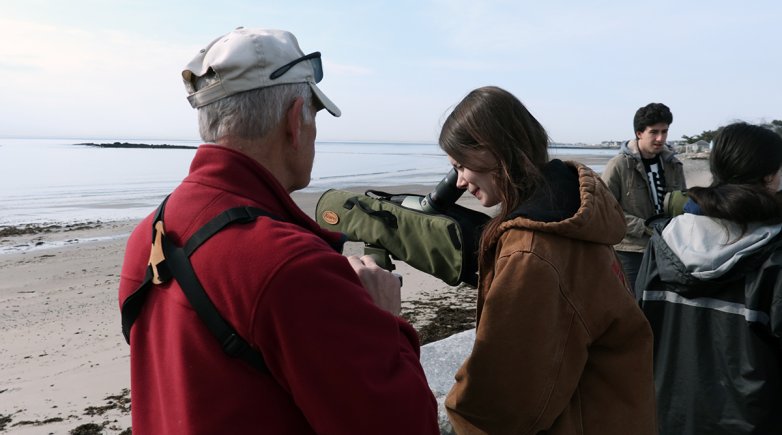Nurturing nature and community
Alums help Exeter celebrate its ninth annual Climate Action Day.
Students tour the campus' central heating plant during the school's ninth annual Climate Action Day.
“I think my heart, maybe your heart too, was born with some sort of wildness in it,” said Dr. Drew Lanham to the students gathered in the Assembly Hall on Monday. Lanham, a conservation ornithologist, poet and professor of wildlife at Clemson University, was the keynote speaker for Exeter’s ninth annual Climate Action Day, which students spent attending workshops, Q&A sessions and hands-on activities focused on environmentalism, conservation and climate change awareness and action.
While Lanham’s research and teaching has focused on the impact of forest management of birds and other wildlife, his more recent work investigates how race and ethnicity relate to wildlife and other conservation issues. In the keynote, he spoke lyrically of his childhood in South Carolina, and growing up with a yearning to be close to nature as well as an awareness of his home state’s violent racist past.
Invoking humans’ responsibilities as “nature’s nurturers,” Lanham repeatedly drew a contrast between our awareness of the natural world and our relationship with technology. He also referenced Exeter’s adoption of its first sustainability and climate action plan, which Principal Bill Rawson ’71; P’08 announced from the stage earlier that morning. “You’ve just committed to foster a culture of sustainability,” Lanham said. “What does that mean? Commit to foster community. That's really what you need to remember.”
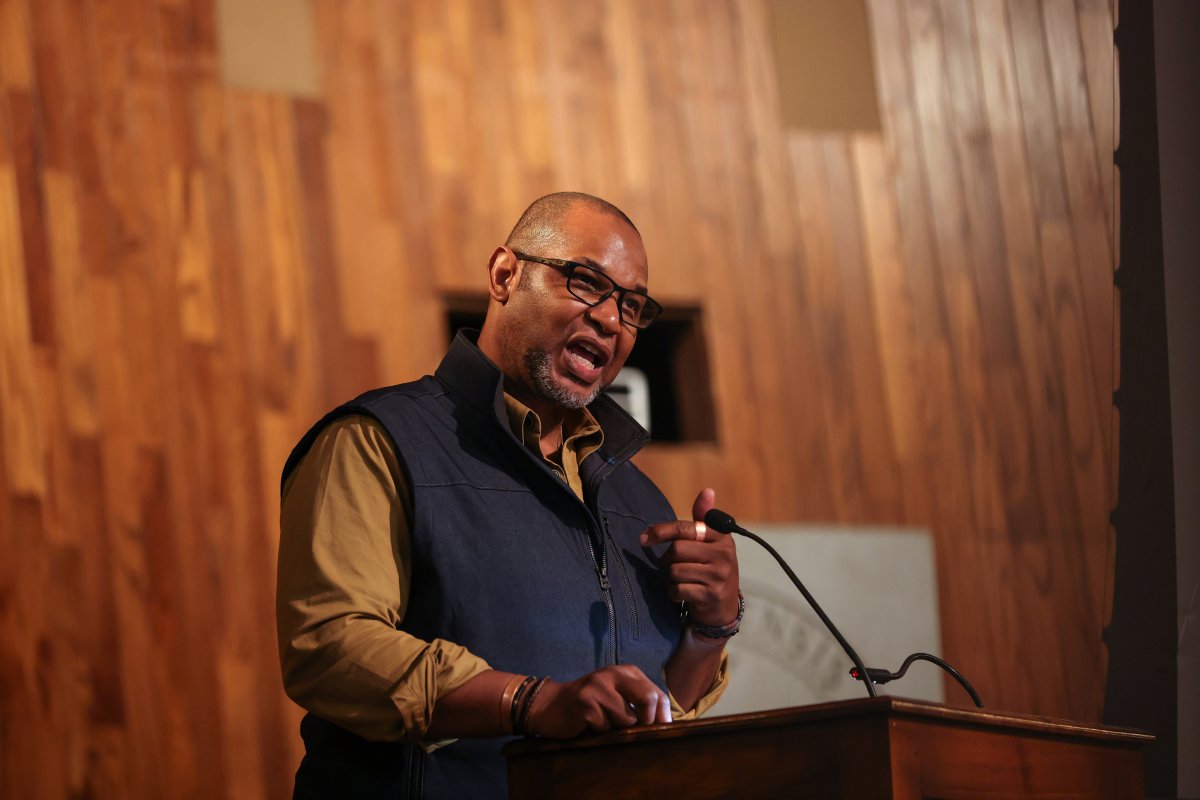
Early on, Lanham admitted that students in the audience and other young people are saddled by the burdens of previous generations, and tasked with solving a climate crisis that is not of their own making. “We expect from you a larger degree of hope,” he said. Near the end of his speech, he challenged them to embrace this mission.
“What does it take for all of you to suddenly become the geothermal wells that bring up heat, that bring up energy, that helps sustain more than your single being?” he said. “There will be more expected of you, Exeter, than others. How will you carry that charge forward?”
Electrifying transportation
The day’s programming included presentations from three alumni. Duncan McIntyre ’00, Madison Condon ’04 and Jackson Parell ’18 exemplify who Principal Rawson called the “future environmental leaders” he hopes the new climate action plan will inspire.
More than 50 students gathered in the Elting Room in Phillips Hall to hear from McIntyre, founder and CEO of the Massachusetts-based company Highland Electric Transportation.
In an interactive presentation titled “Electrifying Our Transportation,” McIntyre started by stressing the huge impact that transportation has on climate change. Around one quarter (23%) of global carbon emissions come from transportation, he said, with that figure reaching one-third (35%) in the United States.
He moved on to present a brief history of electric vehicles, including milestones such as the Bailey, which went 1,000 miles on a battery produced by Thomas Edison in 1910, and Elon Musk’s brash unveiling of the as-yet-unreleased Tesla Roadster in 2006. Today, with nearly every major car manufacturer offering electric vehicles, McIntyre said the industry is moving decidedly toward electrification. “Climate change and public health is one primary reason,” he said. “Technology, [and the fact that electric] vehicles are just better [than they used to be], is the secondary reason, and cost is the third reason — they operate cheaper and longer.”
McIntyre invited students to ask questions, Harkness-style, throughout his presentation. Many of them took him up on the offer, inquiring about the environmental impact of lithium (a key ingredient in electric car batteries), the probability of solar-powered vehicles and the relatively high cost of electric cars as an obstacle to their adoption, among other topics.
While “everyone can make their own decision on whether they buy a gas vehicle or an electric vehicle in the future,” McIntyre stressed that the real environmental impact would come when corporations choose to electrify the fleets of vehicles — school buses, garbage trucks, delivery vans among them— that operate every day. His company, which owns and operates electric school buses for school districts and fleet managers, is working to be part of that conversion.
Clashing ‘experts’
Madison Condon ’04 credits three things from her childhood for putting her on the path to try to save the planet. The environmentally conscious cartoon Captain Planet, the Dr. Seuss conservation parable The Lorax, and a TIME magazine report in the mid-1990s on the threat of climate change.
“I just remember thinking ‘Well, this seems like an important problem,’” she recalled.
Condon was back on campus — and on the Assembly Hall stage for what she said was the first time — to speak to students about the climate crisis. Her address was titled “Fighting Corporate Lies,” but her self-described “chaotic” presentation was more a history lesson on the struggle to inform about and respond to climate change and the long-standing division between science and economists on the crisis’ impact.
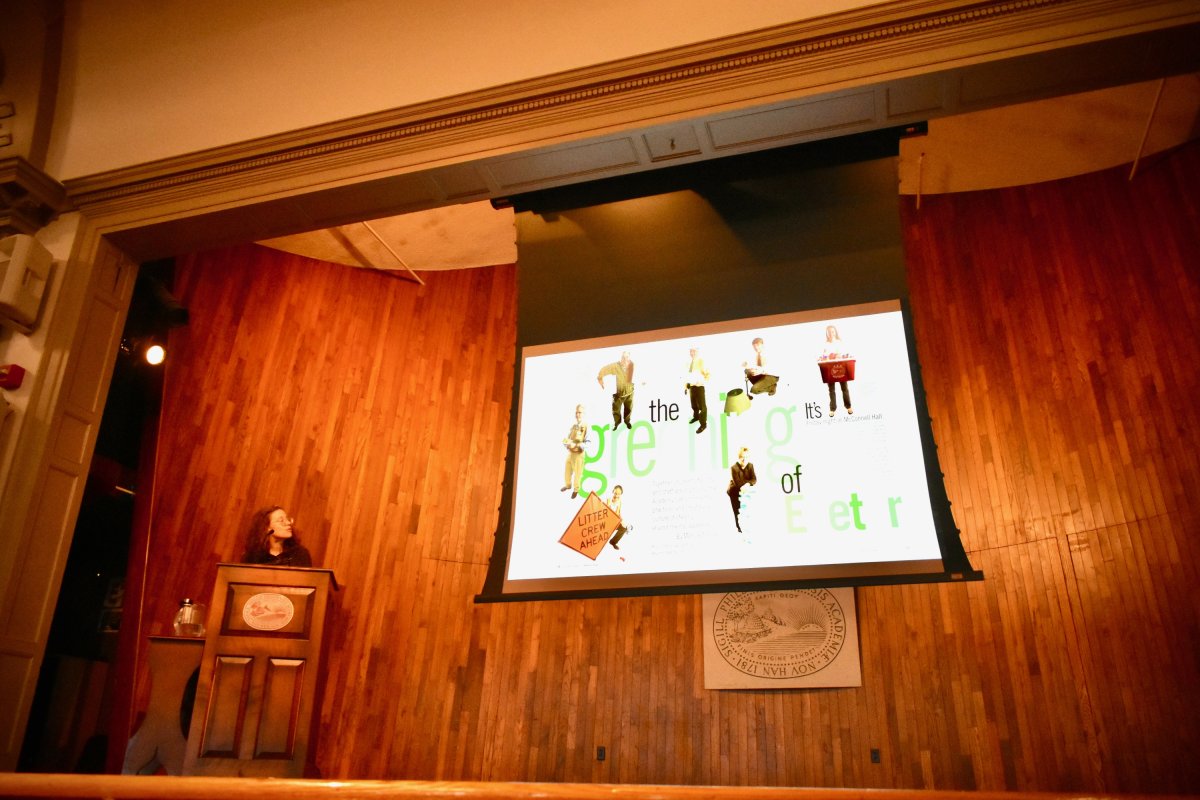
Condon teaches environmental and corporate law at Boston University. A focus of her recent research is climate change’s relationship to corporate governance, market risk and regulation. She opened her remarks Monday by expressing envy for a time in the 1970s, when passionate activists moved mountains that resulted in the founding of the Environmental Protection Agency, the passage of the Clean Water Act and a general awareness that society needed to act.
“Moms actually lit ‘E.P.A.’ on fire in gasoline on one of their lawns and took EPA officials hostage, these moms. People were very agitated about the environment, and I think about this a lot and say, ‘Why aren’t we doing that?’”
“Why aren’t we so mad? Because it’s just as bad, really. It really is.”
She used milestones in her own life as markers in the timeline of climate science and the understanding of the issue, conveying the slow pace of action in the face of knowledge. The first Intergovernmental Panel on Climate Change report, zeroing in on human-affected global warming, was published in 1990, for instance. The alarm bell has been ringing for decades, and yet society is not responding to the warnings.
Much of the blame for that, Condon posits, belongs to economists who too often have disregarded science in their analysis of climate change’s impact on the global economy. Repeatedly, policy makers have made decisions based those faulty narratives.
“I’m really mad that economists have dominated the policy space for a very long time, although that is waning,” Condon said. “It’s 2023, and economists are still doing a bad job.”
A walk in the woods
It took a global pandemic, years of soul searching and a near death experience for Jackson Parell ’18 to figure out how he could make an impact in the fight against climate change. But as he told Exeter students, all you really need is passion.
Speaking virtually, the Stanford University senior talked about completing an 8,000-mile hiking adventure that helped him find his life’s calling. In the early days of the COVID-19 pandemic, Parell and three classmates left California to quarantine in Jackson, Wyoming. It was there that the earliest seeds, of what would become a record-breaking accomplishment, were sown. Parell and another of his displaced friends, Sammy Potter, would spend months planning and training to hike three of the longest trails in the United States all within 2021 — a feat known as the Calendar-Year Triple Crown. What’s more, Parell would be the youngest to ever do it.
Throughout their journey, the two battled exhaustion, heat, cold, snow, rain and physical ailments. It was an especially harrowing moment that helped shape Parell’s path post-hike.
While on the Pacific Crest Trail in Oregon, Parell and Potter were hiking separately. Parell was stopped along the route by law enforcement alerting him of wildfires in the area. Suddenly surrounded by a “massive plume of smoke” and with no way of knowing if Potter was hiking into danger, Parell says he felt a “sense of morbid anticipation” that the worst had happened to his friend. Potter emerged unharmed, Parell explained, before saying, “I realized in that moment how climate change made me feel and I hated it. This was a really seminal moment for me, my entire focus has been around the issue of climate change and how we can do a better job to address it.”
After his hike, Parell returned to Stanford with a new focus formed by his time on trail. “I've done a lot of research on wildfires and my senior thesis involved mapping PM2.5, which is the main pollutant from wildfires across the United States and looking at the effect of PM2.5 as well as proximity to wildfires on mental health.”
Parell left students with words of motivation, hoping they too might find their own moments of clarity that would lead to a life of positive impact on the world.
“Start that process of figuring out what your passion is as soon as you leave this room. And if you can't find it immediately in front of you, then identify something you like. For me that was being outdoors, and then try something new. Go outside your comfort zone. It doesn't have to be the [the Triple Crown] but just something new. Because you just might find your passion.”
